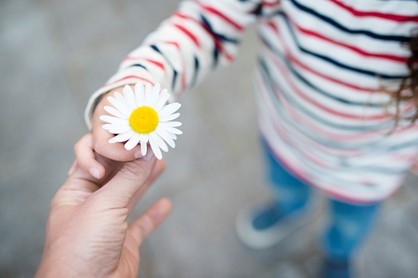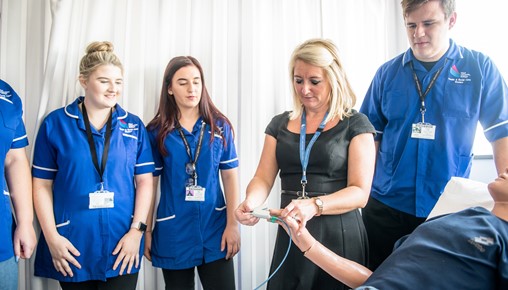
Understanding Adverse Childhood Experiences Level 2

- Length 12 Weeks
- Study Online Learning
- Location Online
Qualification Gained
Level 2 certificate in Understanding Adverse Childhood Experiences NCFE Cache
Levels ExplainedMore about the course
Children and young people are amongst the most vulnerable in our society when it comes to the impact of adverse circumstances on their lives. Adverse childhood experience can have impacts on the development and mental health of children and young people that may persist into adulthood and affect their life chances.
These might be personal circumstances such as the death or divorce of parents or domestic violence, for example, or national and international disasters. Children and young people affected by such events need support to strengthen their resilience and empower them to overcome their fears and the challenges they face.
How often does this course run?
Start dates for this course are flexible and can be joined anytime throughout the year. Once you have made your application, one of our advisers will be in touch to discuss your preferred start date.
Entry requirements
- A good level of English and Maths is required, for example GCSEs at Grade A*-D
or
- Equivalent at pass level
What will I achieve?
If you successful complete this course, you will receive a Level 2 certificate in Understanding Adverse Childhood Experiences NCFE Cache
What will I learn?
- Exploring childhood and family structures
- Introduction to adverse childhood experiences
- Developing strategies to improve outcomes for children affected by adverse childhood experiences
How am I assessed?
- Assessments
Where can I progress?
-
Level 2 Certificate in Understanding Children and Young People's Mental Health
-
Level 2 Certificate in Understanding Behaviour That Challenges
Course costs
Course fees will be discussed at the initial information and guidance on enquiry. Most of our courses are funded, depending on the individual circumstances.
Contact our team
Meet our students and tutors

Alicia
Health and Social Care StudentI’ve been enjoying learning about the different diseases, the heart in the anatomy unit, as well as aspects within public health, such as: medicines, different treatment and strategies that the government put into place to help the public. I’d recommend West Lancashire College to all high school students, as I was able to explore different careers as the tutors accommodated my learning in order to suit my interests.
What can I do with a qualification in Health and Social Care?
Daily tasks:
- Assesses and advises on factors affecting business performance.
- Determines staffing levels appropriate for accounting activities.
- Plans external and internal audit programmes, arranges for the collection and analysis of accounting, budgetary and related information, and manages the company.
- Participates in the formulation of strategic and long-term business plans, assesses the implications for the organisation financial mechanisms and oversees their implementation.
Daily tasks:
- Stays abreast of and ensures adherence to relevant legislation regarding tendering and procurement procedures.
- Researches and identifies new products and suppliers.
- Interviews suppliers.
- Arranges for quality checks of incoming goods and ensures suppliers deliver on time.
- Negotiates prices and contracts with suppliers and draws up contract documents.
- Devises purchasing policies, decides on whether orders should be put out to tender and evaluates suppliers.
- Determines what goods, services and equipment need to be sourced.
Daily tasks:
- Stays abreast of relevant legislation, considers its impact on the organisation.
- Considers alternative work procedures to improve productivity.
- Examines and reports on company and departmental structures, chains of command, information flows, etc. and evaluates efficiency of existing operations.
- Develops and administers salary, health and safety and promotion policies.
- Undertakes industrial relations negotiations with employees.
- Provides or arranges for provision of training courses.
- Oversees the monitoring of employee performance and career development needs.
- Oversees the preparation of job descriptions, drafts advertisements and interviews candidates.
- Determines staffing needs.
Daily tasks:
- Carries out research into aspects of the natural world.
- Prepares applications for funding to other organisations, and assessing applications for funding from other organisations.
- Promotes conservation issues via educational talks, displays, workshops and literature and liaison with the media.
- Maintains and develops knowledge in relevant policy areas within a national and European legislative context.
- Liaises with other groups in the selection and maintenance of the Protected Site System including Special Areas of Conservation (SACs), Ramsar sites, and Sites of Special Scientific Interest (SSSIs) and National Nature Reserves (NNRs).
- Provides advice and information to government at national and local levels, clients, landowners, planners and developers to facilitate the protection of the natural environment.
- Implements, evaluates and monitors schemes for the management and protection of natural habitats.
- Carries out environmental impact assessments and field surveys.
- Promotes and implements local and national biodiversity action plans, particularly with regard to threatened species and habitats.
Daily tasks:
- Provides professional guidance to clients, government agencies, regulators and other relevant bodies, having regard for sustainable approaches and solutions.
- Implements, reviews and advises on regulatory and legislative standards, guidelines and policies.
- Assists organisations to conduct their activities in an environmentally appropriate manner.
- Communicates scientific and technical information to relevant audiences in an appropriate form, via reports, workshops, educational events, public hearings.
- Carries out environmental audits and environmental impact assessments.
- Carries out environment-related desk-based research and fieldwork to collect, analyse and interpret data to determine their validity, quality and significance.
- Implements remediation works.
- Advises on and provides solutions for mitigating the effects of such contamination.
- Identifies contamination of land, air or water and assesses any adverse impact on the environment.
Daily tasks:
- Monitors the standards of scientific and technical research undertaken by the research team.
- Plans work schedules, assigns tasks and delegates responsibilities to the research and development team.
- Develops research methodology, implements and reports upon research investigations undertaken.
- Liaises with production departments to investigate and resolve manufacturing problems.
- Establishes product design and performance objectives in consultation with other business functions.
Daily tasks:
- Supervises the implementation of care and treatment plans by other healthcare providers.
- Prepares and delivers lectures, undertakes research, and conducts and participates in clinical trials.
- Refers patient to specialist where necessary and liaises with specialist.
- Supervises patient.
- Administers medical tests and inoculations against communicable diseases.
- Diagnoses condition and prescribes and/or administers appropriate treatment/surgery.
- Examines patient, arranges for any necessary x-rays or other tests and interprets results.
Daily tasks:
- Applies psychological treatment methods to help athletes achieve optimum mental health and enhance sporting performance.
- Applies professional knowledge and techniques within the workplace, addressing issues such as job design, work groups, motivation etc..
- Maintains required contacts with family members, education or other health professionals, as appropriate, and recommends possible solutions to problems presented.
- Studies psychological factors in the treatment and prevention of mental illness or emotional and personality disorders.
- Analyses the effect of hereditary, social and physical factors on thought and behaviour.
- Observes and experiments on humans and animals to measure mental and physical characteristics.
- Develops treatment and guidance methods and gives treatment or guidance using a variety of therapy and counselling techniques.
- Develops and administers tests to measure intelligence, abilities, aptitudes, etc. and assesses results.
Daily tasks:
- Ensures that drugs and medicaments are in good supply and are stored properly.
- Tests and analyses drugs to determine their identity, purity and strength.
- Liaises with other professionals regarding the development, manufacturing and testing of drugs.
- Maintains prescription files and records issue of narcotics, poisons and other habit-forming drugs.
- Checks that recommended doses are not being exceeded and that instructions are understood by patients.
- Highlights a drug.
- Advises health professionals on the selection and appropriate use of medicines.
- Prepares or directs the preparation of prescribed medicaments in liquid, powder, tablet, ointment or other form following prescriptions issued by medical doctors and other health professionals.
Daily tasks:
- Carries out research with glass and lens manufacturers.
- Refers patient to a specialist, where necessary.
- Advises patient on proper use of glasses, contact lenses and other aids, and on appropriate lighting conditions for reading and working.
- Prescribes, supplies and fits appropriate spectacle lenses, contact lenses and other aids.
- Examines eyes and tests vision of patient, identifies problems, defects, injuries and ill health.
Health and Social Care at West Lancashire College

News
Upcoming events

Apprenticeship Information Event
West Lancashire College
Wednesday 1st May 2024
4:30pm - 6:00pm

Trade Fair
West Lancashire College
Tuesday 14th May 2024
4:30pm - 6:00pm

Apprenticeship Employer Breakfast
West Lancashire College
Friday 17th May 2024
8:45am - 10:00am
Either
- The level required to start the course
- The level rewarded when completing the course
Course Added
This course has now been added to your basket. Please click below to apply now or contine browsing.
Apply Now

